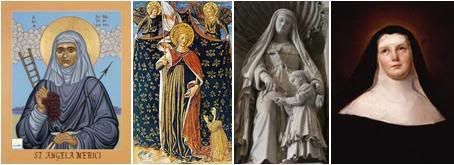| | | OFFLINE | | Post: 26.172
Post: 8.664 | Registrato il: 28/08/2005
Registrato il: 20/01/2009 | Administratore | Utente Master | |
|


January 27, Third Sunday in Ordinary Time
HOLOCAUST REMEMBRANCE DAY
WORLD DAY OF PRAYER FOR THE HOLY LAND
WORLD LEPROSY DAY

Middle photos: Painting by Bozzoli, and founder statue in St. Peter's Basilica.
ST. ANGELA MERICI (Italy, 1470-1740)
Third-Order Franciscan, Founder, Company of St. Ursula
Born in Desenzano by Lake Garda, Angela spent most of her life in nearby Brescia. Early on,
she became interested in educating poor children and joined the Third Order of St. Francis
for laywomen. In 1524, she was on her way to visit the Holy Land and was said to have gone
suddenly blind in Cyprus. She proceeded with the pilgrimage anyway, and on her way back to
Italy, is said to have regained her sight in the same place in Cyprus where she went blind.
At the age of 62, she founded the Company of St. Ursula, named after the patron saint of
medieval universities, dedicated to 're-Christianising family life' through educating girls to be
Christian wives and mothers. The Ursulines were the first teaching congregation of sisters, but
they remained 'secular' - not living in communities - for 17 years before seeking recognition
as an order. Their sisters have since then had the choice to be 'religious' enclosed nuns, or
'congregated' who follow the original plan. Ursulines were the first missionary nuns to Canada
and what is now the United States. Today, Ursuline educational institutions are found worldwide.
Mother Angela was canonized in 1807.
Readings for today's Mass: www.usccb.org/bible/readings/012713.cfm
AT THE VATICAN TODAY
Sunday Angelus - Reflecting on today's Mass readings, the Holy Father cites Jesus's brief comment
on the passage from Isaiah that he was given to read at the synagogue in Nazareth, about which he told
the congregation, "Today this Scripture passage is fulfilled in your hearing.” The Pope said the adverb
'today' applies to all men between the first and second coming of Christ, and that on this day,
it also refers to Sunday, which must be dedicated to the Lord in listening to his word, in prayer,
and in the celebration of the Eucharist. And to every day that man must be ready for conversion,
ready to 'seize the day' when the Lord calls us to salvation. Afterwards, he greeted the youth arm of
Italian Catholic Action for their annual Caravan for Peace, releasing two doves of peace with two children
representing the movement; and reminded everyone that it is also Holocaust Remembrance Day today,
as well as World Day of Prayer for the Holy Land, and World Leprosy Day.
January 29, 2013
P.S. Two days late, but nonetheless worth noting:
Wolfgang Mozart,
born January 27, 1756
by R.J. Stove

MOZART, WOLFGANG (Austrian, 1756–91). No, not “Amadeus” - his baptismal certificate reads “Joannes Chrysostomus Wolfgangus Theophilus Mozart” - “Amadé” (the form of his middle name that Mozart himself preferred to use) being the Gallicized form of Theophilus.
The face that launched tonloads of chocolate boxes belonged to one who seethed with anger over rivals now largely forgotten; whose repeated failures to obtain or keep well-paid jobs with emperors and prelates derived in almost every case from his own inability to hold his tongue; and who employed servants even during his worst periods of Viennese impoverishment, a detail irksome to sentimentalists.
One thing in his largely misbegotten career he did get right: he acknowledged Haydn’s genius, and a symbiotic relationship existed between the two men. To a minor composer who sniffed at an unconventional passage of Haydn’s — “I would not have written it that way” — Mozart delivered a bruising snub: “Nor would I. And do you know why? Because neither I nor you would have thought of it!”
Difficult though it is to single out a solitary area of Mozart’s chamber composition for special applause, his string quintets are almost universally regarded as excelling all else that he produced in chamber music. Of Mozart’s mature operas, The Marriage of Figaro, The Magic Flute, and Don Giovanni have been favorites for most of the last two centuries. Così Fan Tutte, on the other hand, only entered the repertoire after World War II, its few stagings before that date having often been in bowdlerized versions. No aspiring pianist would even consider ignoring the best of Mozart’s twenty-seven concertos; similarly, no aspiring conductor could possibly ignore Mozart’s three last symphonies, including the Jupiter. The list goes on. [Stowe fails to mention Mozart's sacred music./C]] There are 626 items in the official catalogue of Mozart’s works, a catalogue compiled not by Mozart but by nineteenth-century musicologist Ludwig Köchel (hence the “K” that appears before the number of a particular composition). When it comes to discovering Mozart, you have your whole life before you...
As a child, I was so impressed by the odd occurence that in 1956, the University of the Philippines, which would become my Alma Mater, saw fit to celebrate the 200th anniversary of Mozart's birth with a yearlong music festival dedicated to his works.
[Modificato da TERESA BENEDETTA 30/01/2013 19:00] |